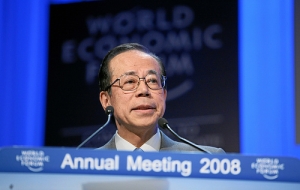Japan: Sticking with carbon labels
 After rejection of a cap-and-trade plan, Japan is hanging its hopes on carbon labelling.
After rejection of a cap-and-trade plan, Japan is hanging its hopes on carbon labelling.
The Japanese government is turning to carbon labels to persuade business to tackle climate change, after its plan for an emissions trading scheme failed to win over bosses.
Japan’s leaders want the country to cut greenhouse gas emissions by at least 60% by 2050. They hope the voluntary use of carbon labels, showing a product’s carbon footprint, will get companies to compete on cutting their carbon impacts.
The trade, economy and industry ministry has set up two study groups to develop a carbon labelling system for businesses. Retailers Aeon, Seven Eleven, Seiyu, Uny, Lawson, Matsushita Electric and Sapporo Breweries are all involved in the groups, which were formed in June and July.
The government formed another group, the domestic committee for international standardisation of carbon footprint system, also in July. The committee will represent Japanese interests in the development of an international carbon footprint system by the International Organization for Standardization. It counts 27 industry groups, three consumer groups and several ministries among its members.
About 30 Japanese companies will showcase carbon labels on selected products at the Eco Expo exhibition in December, according to trade ministry officials. But so far just one firm, brewer Sapporo, has publicly committed to doing so. Others that Ethical Corporation spoke to declined to comment, saying they would first like to understand the calculation method.
In June, Japanese prime minister Yasuo Fukuda’s plan to enforce emission reduction targets for companies under a cap-and-trade scheme was opposed by powerful industry groups, including the Japan Business Federation, the Japan Iron and Steel Federation, and the Federation of Electric Power Companies.
The chief executives of some of Japan’s largest companies – including Canon, Toyota, Nippon Steel and Tokyo Electric – were openly critical of the plan. “Tougher emission targets will force companies to shift their production from Japan to other countries,” warned Shoji Muneoka, president of Nippon Steel, the world’s second largest steelmaker behind ArcelorMittal.
Environmentalists say Japanese companies are not doing enough to reduce emissions. A report in August from the European Federation for Transport and Environment said Japan’s Nissan, Mazda and Suzuki were among the worst performers in meeting the European Union’s proposed target for carmakers of a 17% CO2 reduction by 2012. Toyota and Honda ranked fourth and fifth, behind European carmakers.
Carbon labels are a modest step for business in Japan towards addressing climate change. The government and campaigners will hope they are a prelude to more serious green efforts.
This article was first published in the October 2008 issue of Ethical Corporation magazine.
You can return to the main Market News page, or press the Back button on your browser.

